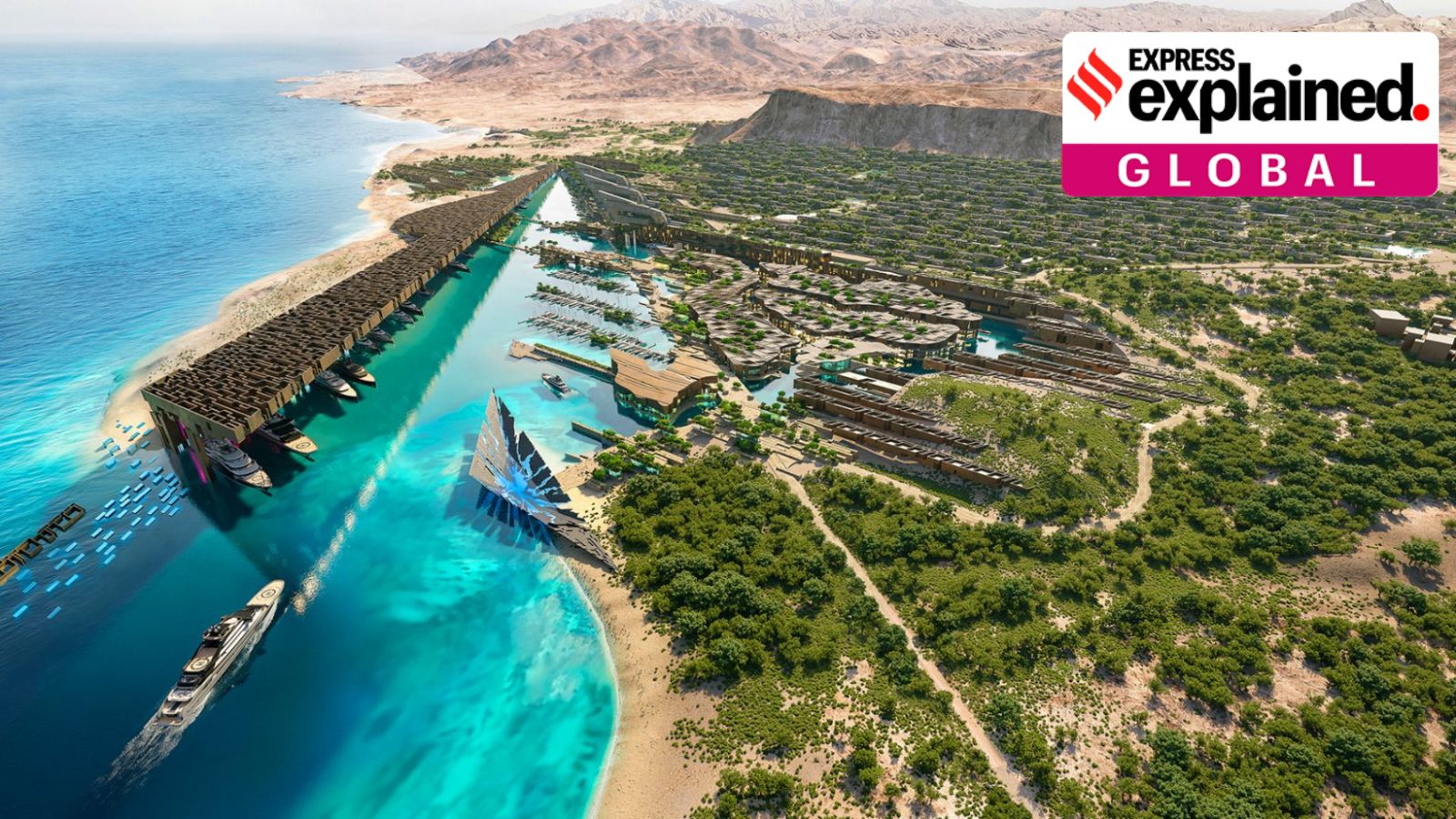All about Neom, the controversial Saudi project that promises a desert utopia
Neom, the ambitious megacity project mooted by Crown Prince Mohammed bin Salman came under fire following a report in The Wall Street Journal earlier this month, which detailed the apathy of top executives heading the project.
 Neom was visualised as part of Saudi Arabia’s ambitious Vision 2030 project, which aims to diversify the economy into various industries and reduce its dependence on oil. (Photo - Neom/Magna)
Neom was visualised as part of Saudi Arabia’s ambitious Vision 2030 project, which aims to diversify the economy into various industries and reduce its dependence on oil. (Photo - Neom/Magna)Earlier this month, The Wall Street Journal published a highly critical report on Neom, the ambitious Saudi megacity project championed by Crown Prince Mohammed bin Salman.
“Saudi Arabia’s Neom project contends with corruption, worker deaths, racism and misogyny,” The WSJ report said. Here is all you need to know about what is the world’s largest construction project, and the many controversies that have plagued it.
What is Neom?
Neom was visualised as part of Saudi Arabia’s ambitious Vision 2030 project, which sought to diversify the country’s economy and thus reduce its dependence on oil.
Spread over an area of 26,500 sq km, Neom is situated in Saudi Arabia’s western Tabuk province. First announced by the Crown Prince in 2017, its name is a fusion of the Greek word “neo” meaning “new”, and the Arabic word “mustaqbal” meaning “future”.
Initially pegged to be a $500-billion project, the costs have swelled to $1.5 trillion, according to a Bloomberg report from April 2024. It is set to be completed in 2039.
Neom will comprise five regions, each home to a project ambitious in design, scale and imagination.
- The Line – Probably the best-known among all the Neom projects, the Line will be built as a 170-kilometre-long mirrored city line spanning 34 square kilometres across the desert. The original plans for the city had “vertically layered” buildings 500 metres tall and 200 metres wide. Designed to be entirely walkable, the city will be powered by 95 per cent renewable energy.
- Oxagon – The Oxagon is an octagonal industrial city which will house an integrated industrial port and residential apartments. Oxagon too will be powered entirely by renewable energy.
- Trojena – Trojena is set to host the Asian Winter Games in 2029. The region is home to Saudi Arabia’s tallest mountains, and will house a ski resort. According to the Neom website, Trojena “experiences sub-zero winter temperatures and has a year-round moderate climate that is cooler on average than the rest of the region”.
- Magna – Magna is designed to be a luxury lifestyle coastal destination, located on the coast of the Gulf of Aqaba . The region will house 12 premiere destinations spanning 120 kilometres, and will be home to a nature reserve which aims to be the “gold standard in sustainable tourism”.
- Sindalah – Sindalah is a luxury island in the Red Sea, which hopes to rival the likes of the Greek isles, the Caribbean Sea and the Mediterranean coastline, all favoured by yacht and boat owners. Set to open this year, Sindalah will span 840,000 square metres.
What are the various controversies that have plagued Neom?
Neom’s development, however, has not been without a hitch. Here are some controversies that have plagued it.
- 01
Displacement of the indigenous residents
The BBC in 2020 reported that Saudi security forces were resorting to force to evict the Huwaitat tribe, the indigenous residents of the Tabuk region where Neom is being built. Col Rabih Alenezi, a former Saudi intelligence officer, told the BBC in May 2024 that he had been ordered to evict the Huwaitat villagers from al-Khuraybah, located 4.5 kilometres south of The Line. He also said that the Saudi authorities had approved the use of lethal force to achieve the same.
The UN in 2023 expressed alarm at the Saudi government’s imminent execution of Huwaiti dissenters for protesting their forced evictions while being charged as terrorists.
- 02
Sluggish progress of the projects
Bloomberg in April 2024 reported that the Neom project had been considerably scaled down. While the goal was to accommodate 1.5 million of the 9 million residents in The Line by 2030, officials currently believe the mirrored city will only house a maximum of 300,000 residents. Additionally, only 1.4 kilometres of the project would be completed by 2030.
This has raised concern about Neom’s readiness to host the 2029 Asian Winter Games in Trojena.
- 03
Apathy of the higher-ups at Neom
From the start, Mohammed bin Salman has delegated key elements of the project to executives who would get the job done by any means. This often meant basic workplace ethics were given a pass and toxic behaviour was actively encouraged. More troublingly, those who were hired often had to leave their previous jobs due to workplace misconduct or crimes.
Following news of the deaths of three construction workers, Wayne Borg, the Managing Director of Neom’s media division felt inconvenienced by the situation and made racist and classist remarks according to The Wall Street Journal. He said, “A whole bunch of people die so we’ve got to have a meeting on a Sunday night”.
Borg went on to call Neom’s blue-collar employees, who mostly hail from the Indian subcontinent, “f–ing morons”, saying “That is why white people are at the top of the pecking order.”
- 04
Concerns about surveillance
A 2020 Neom press release announced its intent to create “cognitive cities,” which would rely on real-time information to anticipate and offer proactive insights to its residents. In effect, this would imply constant monitoring of internet use, and create a surveillance state, something that critics have raised fears of.
- 01
- 02
- 03
- 04
- 05






































